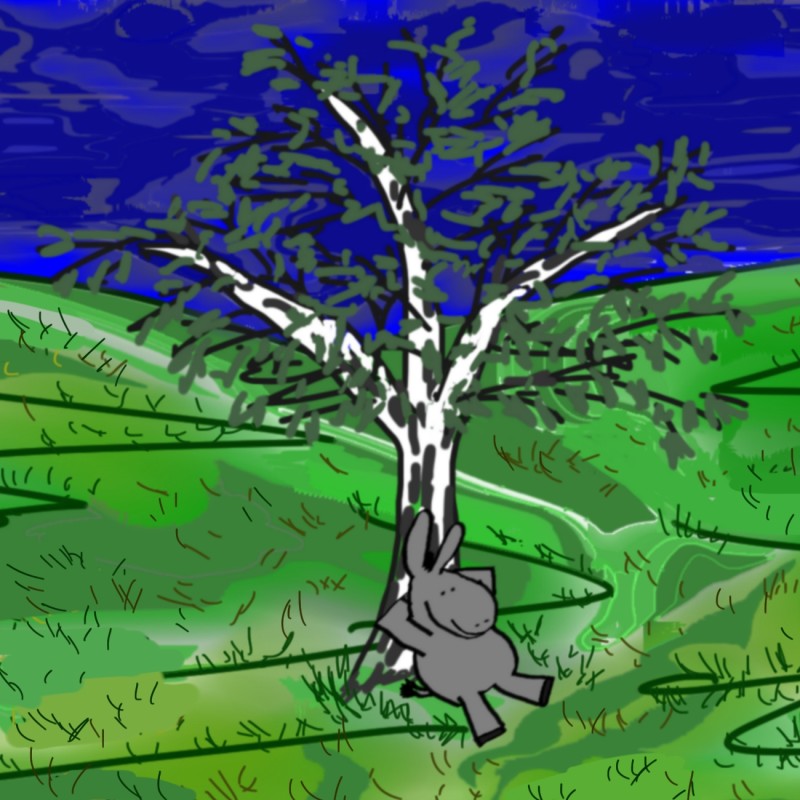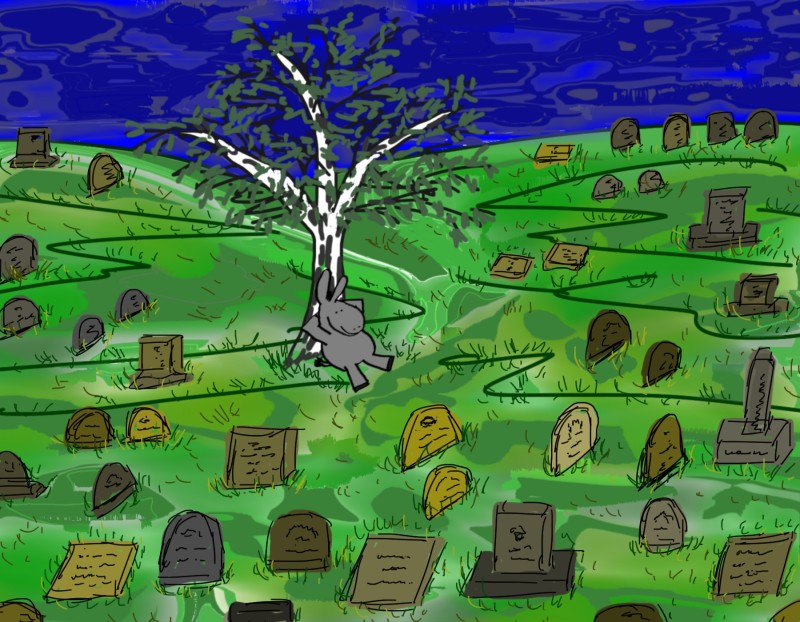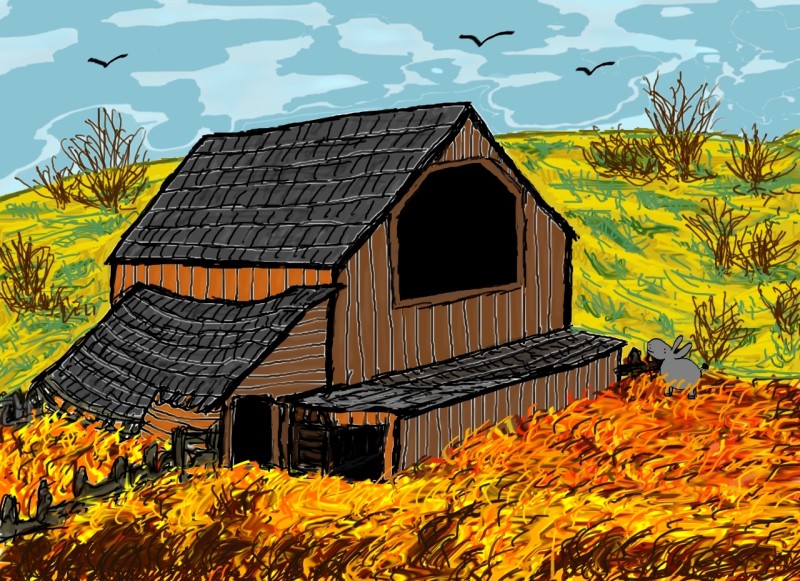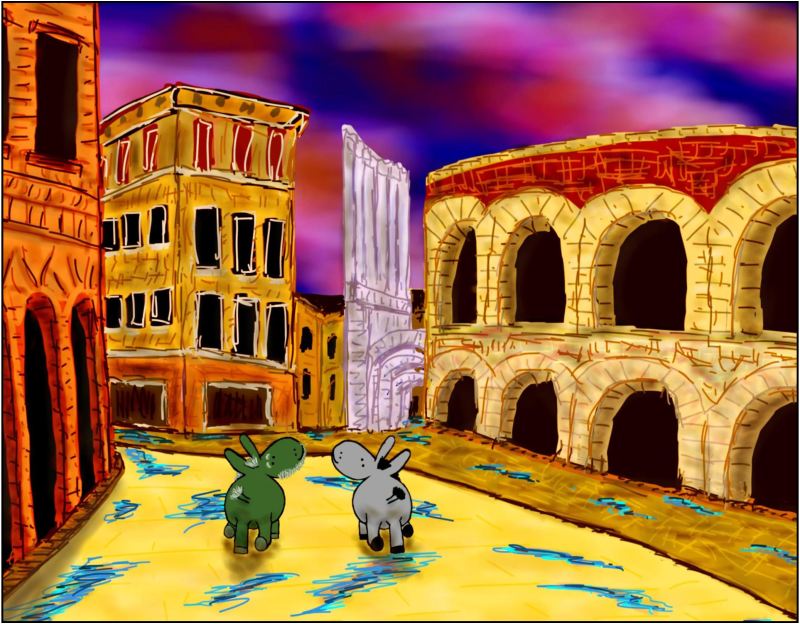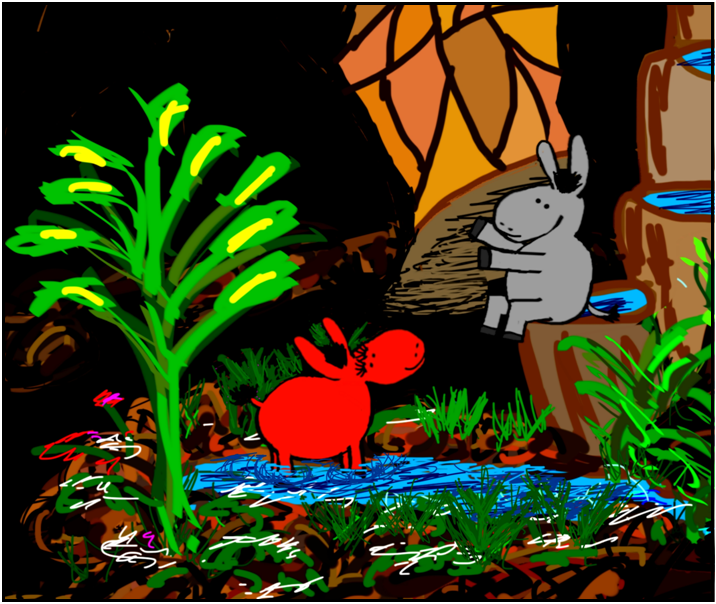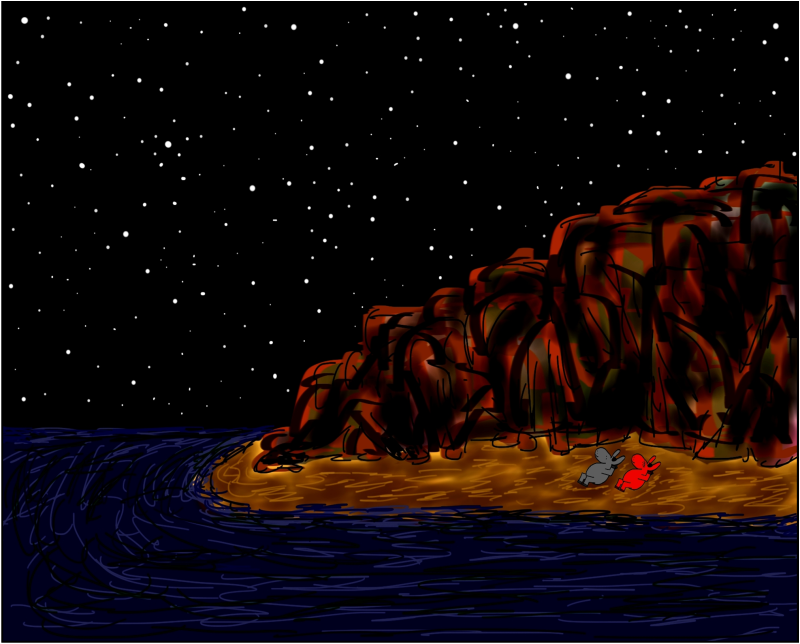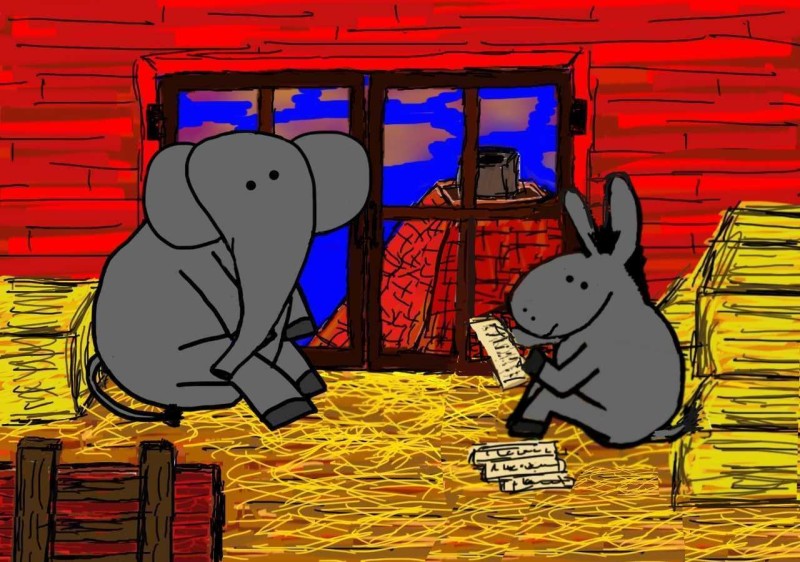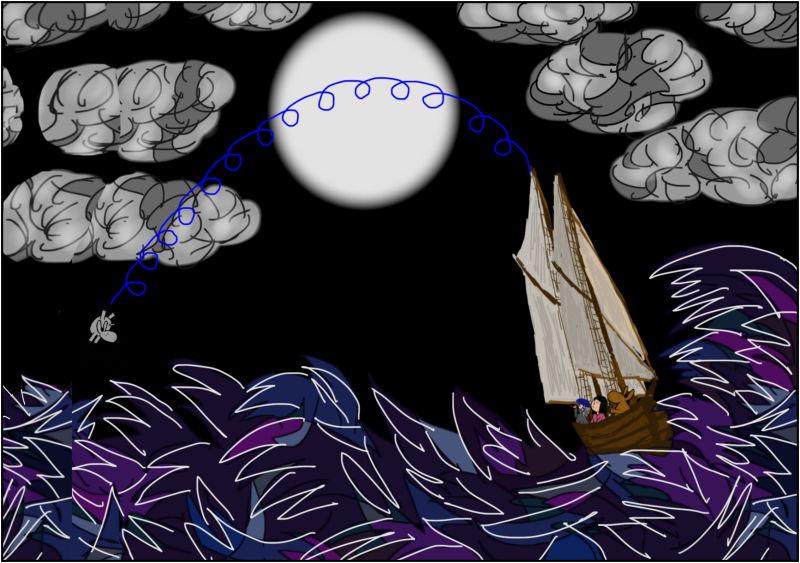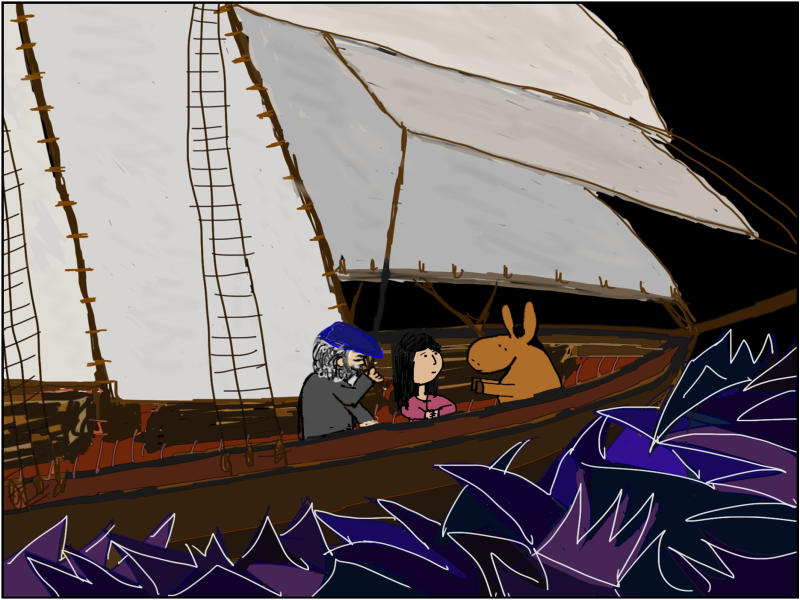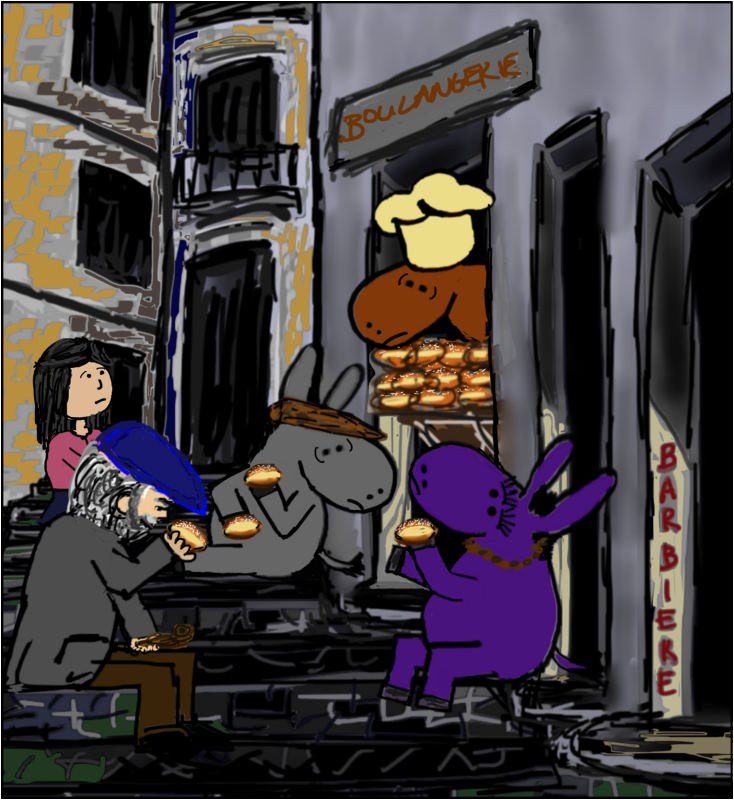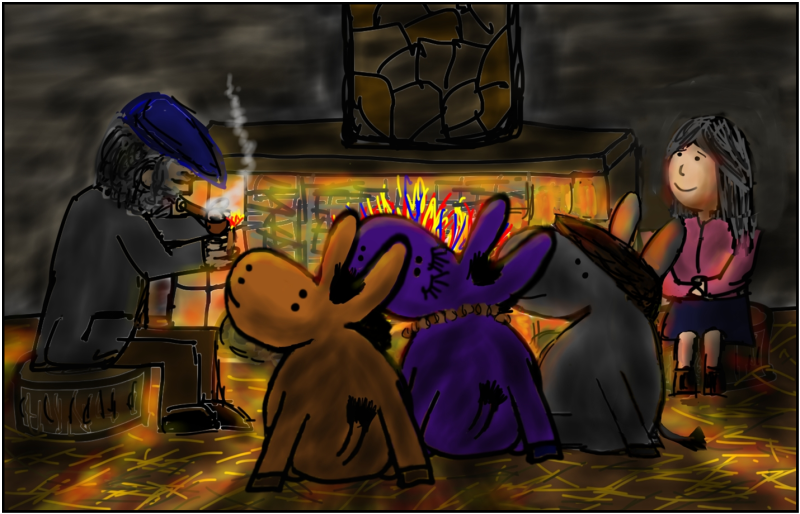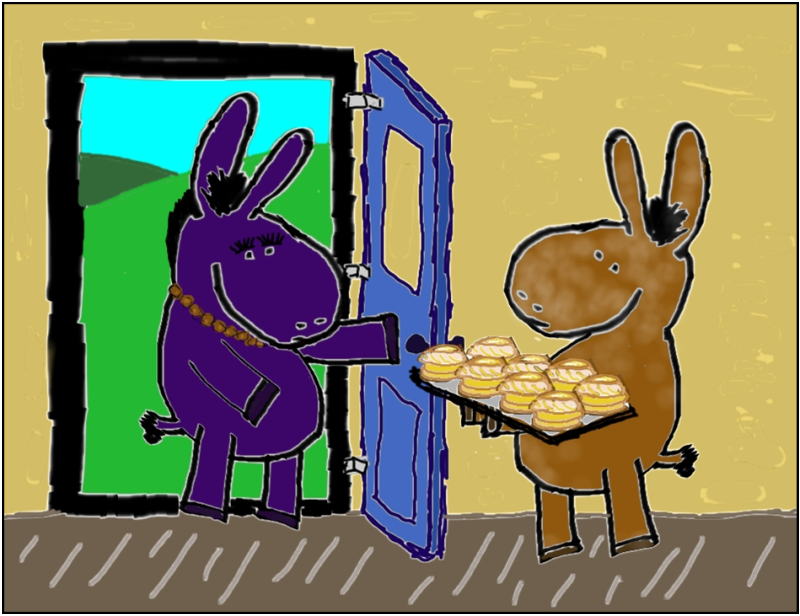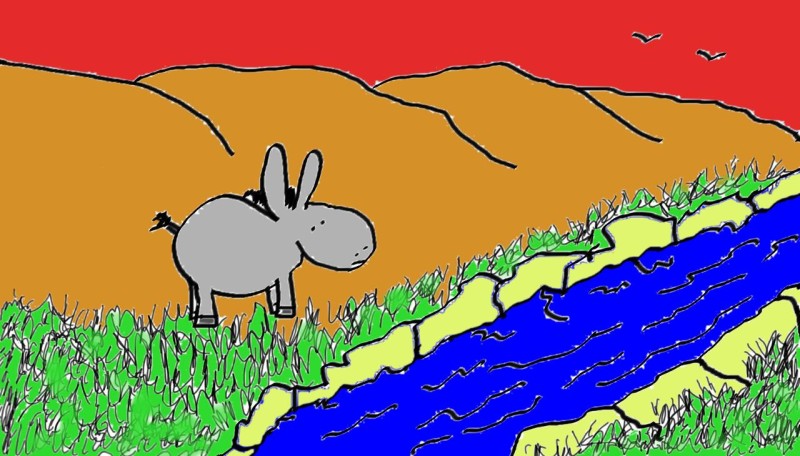I like to spend time with quiet people…
Tag: pics
“Blurtso returns to an abandoned barn”
“Blurtseau Lundif – Corsaire Extraordinaire” (IX)
The days came and went, and the weeks and months, and despite the rigor of his studies, Blurtseau’s mind wandered. In a real sense, he felt he was being torn in two. On one hand was his life as a warrior, defending his homeland and rising against injustice, and on the other was his growing love for culture and the arts, and for simple things. He reveled in the rhymed worlds of Dante and Petrarch, and the playful mischief of Boccaccio, and his thoughts often turned to Echo and the wisdom of her island. But it was too early to give up the physical rapture that had honed his body into a flawless fighting machine, a machine that fought without forethought, spontaneously parrying with a perfect balance of give and take. Yet now, had his instincts been altered? His equilibrium become unbalanced? Was he incapable of action without thought, without considering consequences beyond borders? Was this the price he paid for the loss of ignorance? For the joys of compassion? And as for his future, what did it mean? Fame and fortune now seemed empty next to a life of art, or a life of shared simplicity. Becoming a Renaissance donkey was not turning him into a harmonious whole, as he had hoped and expected, but was tearing him to pieces as the parts of himself vied, one against the others, for preeminence and control. And then there was his irrepressible sentimentality, as he continued to long for distant days with Pableau, Josette, and Echo.
“Blurtseau Lundif – Corsaire Exraordinaire” (VIII)
Blurtseau told Echo about his life before the island—his voyages, the battles he had fought, the perils he had overcome—but though she listened with enthusiasm, she could scarcely imagine the things he described, for they were all things she had never seen. Bloodshed, of which there was much in his stories, was unknown on the island, and though she had witnessed aging in other animals—the goats in particular—the only deaths she had seen were the result of natural cause, and it seemed to her no more troubling than a deep and dreamless sleep. As for the humans, who commanded so much attention in his stories, she had never seen one, and could only picture them as hyper-contentious goats walking upright. The towns and cities were unreservedly fantastic. She could not believe there were such things as streets and houses and palaces constructed from predetermined plans; a physical world built on the airy blueprints of imagination. She concluded that these magical creatures needed to do little more than imagine an object to make it appear, but she wondered why they chose to live in an artificial world rather than the real one that was already around them.
Blurtseau, for his part, found Echo’s innocence to be as unimaginable as his lack of it, and he began to understand that what he saw, even the simplest object on the island, bore little resemblance to what she saw. And the meanings that he understood when he used the words he used were not the meanings she understood when she heard them. But he was enchanted by her innocence, and longed to know what it was like to live in her world, and she was content to play Desdemona to his Othello, losing herself in his tales, imbibing adventure as if slaking her thirst at a secret and mysterious spring.
“Blurtseau Lundif – Corsaire Extraordinaire” (VII)
At this point in the novel, said Blurtso, Blurtseau Lundif and his friends have intercepted the British sugar ship and are fleeing for their lives…
Claude did as directed, with the British sloop behind, until pursuer and pursued were lost from sight beneath the watery peaks. Blurtseau, who could no longer see the enemy ship, turned to descend the rigging, but before he could, a wall of water struck the schooner, causing the hull to rock and roll, and throwing our hero—as if he had been pitched from a catapult—into the frothing jaw of the sea. His companions watched in horror as he soared, head over hooves, describing a perfect parabola across the moonlit sky.
“Blurtseau!” called Pableau.
“Blurtseau!” called Josette.
“Blurtseau!” called Claude. But their comrade could not hear, or if he could, he could not reply, and the rudderless ship, steered now by the storm, drew quickly away, leaving our hero bobbing like a cork on the writhing water.
“We must turn and find him!” cried Pableau.
“Turn whither?” said Claude.
“Blurtseau is an excellent swimmer,” said Pableau. “I’m sure he’s secured a plank, or piece of driftwood, and is paddling for calmer seas. If we circle, describing a broader and broader circumference, we’ll cross him with our bow.”
“Yes,” said Claude, “when the storm has settled.”
And so they waited, tossed and turned in the belly of the gale, until the sky cleared. By dawn the British frigate, carried east with the careening clouds, was no longer to be seen, and the Zurrabelle was free to begin her search.
They sailed for fourteen days and fourteen nights, each day broadening the scope of their search, and each day encountering only sea. On the morning of the fifteenth day Pableau, perched on the foremast, thought he had spied his lost friend, but he was soon dismayed when closer inspection revealed a dark-grey dolphin. Josette, who had been holding up bravely, burst into tears, and Claude drew slowly and solemnly upon his pipe.
“Blurtso considers a new wardrobe”
“Blurtseau Lundif – Corsaire Extraordinaire” (VI)
“These chantillies are delicious!” said Blurtseau.
“Enjoy them while you can,” said Pableau, “they’re the last ones I’ll bake.”
“What?!” said Blurtseau.
“Yes,” said Zurrabela, “haven’t you heard? The British have taken Haiti and cut off the French sugar supply.”
“Can’t you get it somewhere else?” said Josette.
“I’m afraid not,” said Pableau, “90% of France’s sugar is imported from Saint Domingue, that is, Haiti, and the fraction that now remains is taken directly to Paris.”
“Quelle catastrophe!” cried Blurtseau.
“What can you do?” said Josette.
“Nothing,” said Zurrabela, “except discontinue pastries and bake only baguettes.”
“I’ve been thinking about your sugar problem,” said Claude, “and I have an idea.”
“Yes?” said Pableau.
“A friend of mine owns a fishing schooner, and he owes me a favor.”
“A favor?” said Zurrabela.
“Yes,” said Claude, “I saved his life in 1772, and he has agreed to lend me his boat for a short excursion.”
“An excursion?” said Blurtseau.
“Yes,” said Claude, “a sugar excursion.”
“What do you mean?” said Pableau.
“As you may know,” said Claude, “the British have been trying to befriend the Knights of Malta in order to gain an outpost in the Eastern Mediterranean, and they have been sending them shiploads of sugar and tea. The British ships depart from Gibraltar, skirt the North African coast, then cross to the coast of Italy, down to the Strait of Messina, and on to Malta. They sail within sight of land at all times, except when they cross from Africa to Italy, at which point they are momentarily vulnerable to a pirate attack.”
“A pirate attack?” said Josette.
“Arrrrgghhhh,” growled Blurtseau, “a pirate attack!”
“Arrrrgghhhh!” growled Pableau.
“Arrrrgghhhh!” growled Zurrabela.
“Arrrrgghhhh!” growled Claude, Josette, Blurtseau, Pableau and Zurrabela.
“Blurtseau Lundif – Corsaire Extraordinaire” (V)
At this point in the story, said Blurtso, Blurtseau Lundif, reunited with Pableau in Roquebrune, France, questions the new course of his nation…
“I only want what is best for France,” said Blurtseau.
“What you want,” said Zurrabela, “is a reality that can be measured, a world that can be defined; not a process, but a paralysis.”
“I want a consistent process,” said Blurtseau, “one in which the principles of right and wrong are constant, and I can act with certainty.”
“But that is not a process,” said Zurrabela, “that’s a closed sphere that excludes all that lies beyond it, an imaginary world that denies the world at large. In all the battles you fought, on land and at sea, did it never occur to you that the enemies you faced believed that they were as ‘right’ and ‘justified’ in their beliefs as you were in yours? If you look closely, you will see that the dynamic that once took place beyond the borders of France, is now taking place within.”
“Yes,” said Blurtseau, “I see that, but I can’t tell which group is right, which group has the true interest of France at heart.”
“That,” said Zurrabela, “is for your countrymen to decide. It is the essence of democracy, and the responsibility that accompanies the future you seek. You can no longer be a follower, obeying as you would the lead of a king. Your country has set sail for a new world, a world whose challenges go beyond the question of national obedience, to the greatest challenge of all, that is, governing your self, coming to your own conclusions and acting on personal conviction. What is right? What is wrong? For France, for others, for me? These are the questions that each citizen must ask, the questions that your fellows are risking their lives to be able to ask.”
“Blurtseau Lundif – Corsaire Extraordinaire” (IV)
At this point in the story, said Blurtso, Blurtseau Lundif and his faithful First Mate, Pableau la Chanson, are hiding from French spies in Sagres, Portugal. Pableau, having recently fallen in love, has gone to Evora in search of a beautiful donkey he saw only one time in Sagres…
The day dawned damp and chilly, long after Pableau had risen from his water-logged straw to fire the bakery ovens. He had been toiling for hours when the first customers arrived, and by then the air in the shop was warm and dry, and even the cracks in the walls were thick with the scent of bread. Although it had been more than three months since his arrival, and though his excursion to the villa had been in vain, Pableau’s resolve remained firm, for despite his repeated failures he knew that the story of the boulanger in search of the hoof was making its way around town, and that notice of his existence would eventually fall upon the ears of the one he sought.
He was consoling himself with this hopeful, patient logic as he placed a fresh tray of chantillies in the pastry window, when a carriage suddenly appeared on the street, and before he could comprehend what was happening, he saw the most beautiful donkey in the world descend from the coach…
“Are you Pableau the baker?” she asked, when she had stepped inside.
“Yes,” said Pableau, “I am.”
“And you have been seeking me for over three months?”
“Yes,” said Pableau, “I have.”
“Having seen only my hoof? And having seen it on only three occasions?”
“Yes,” said Pableau.
“And you have been discovered in the garden of my quinta,” she said, “by my eyes and others’, skulking about the shrubberies?”
“That,” said Pableau, “I cannot say, for your eyes may well have seen me, but mine, sadly, did not see you. But yes, he continued, I was indeed on the grounds, for I bribed the gatekeeper to let me pass.”
“I see,” said Zurrabela, “and now, may I know what you expect of me?”
“I expect nothing,” said Pableau, “I only hope.”
“Hope?” said Zurrabela. “And what do you hope?”
“I hope,” said Pableau, “that yours is the heart I am seeking, and that mine is the heart you seek.”
“But,” said Zurrabela, “that hope is without reason, for you have sought only a hoof.”
“Yes,” said Pableau, “that is true, but I know my heart, and my heart knows reasons that reason knows not.”
“But how can you be sure,” said Zurrabela, “that I seek any heart at all?”
“I cannot be sure,” said Pableau, “I can only hope.”
“Yes,” said Zurrabela, “as you have said… may I know how long you will lodge in Évora?”
“Until my dreams are answered,” said Pableau, “or until they expire.”
To this last statement Zurrabela did not respond, but only gazed at the flour-covered donkey who had searched for her, tirelessly, having seen only a hoof. Pableau, too, remained silent, meeting her glance with one of his own, a glance that was open, unguarded, and fortified with conviction. Then Zurrabela made a motion to speak, but stopped, collected herself, and left the shop. Pableau remained inside, watching to see if she would make herself seen at the window of her coach, but she did not; instead he saw only what he already knew, an incomparable hoof, waving to the driver, in a gesture to depart.
“Blurtso crosses the river”
Well, I guess it’s time to cross the river. The river was wide and the current was strong and Blurtso could not tell how deep it was. I suppose it will wash me to sea, he thought, testing the water with his hoof. I suppose I will float for a while and then sink like a stone. I suppose I will become part of the river before I reach the sea.
